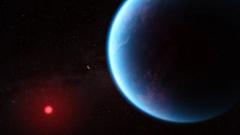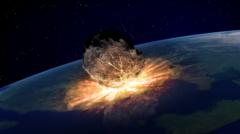Scientists have unveiled intriguing evidence suggesting that K2-18b, a distant exoplanet, may host life forms. A research team at Cambridge University has analyzed the planet's atmosphere using NASA's James Webb Space Telescope (JWST) and identified chemical indicators typically associated with biological processes on Earth. This discovery marks the second instance of potential life-related chemicals being detected in K2-18b's atmosphere, heightening hopes regarding the existence of life beyond our planet.
Lead researcher Prof. Nikku Madhusudhan expressed optimism that more definitive proof could be obtained in a year or two. He emphasized the significance of their findings, which suggest the presence of dimethyl sulphide (DMS) or dimethyl disulphide (DMDS) — organic molecules produced by terrestrial marine life. The findings are particularly noteworthy as the estimated quantities of these gases appear to be thousands of times greater than those found on Earth.
Despite the excitement surrounding these findings, researchers also underscore the importance of exercising caution. The preliminary nature of the data means that further validation is necessary before solid conclusions can be drawn. Current results stand at a “three sigma” confidence level, translating to a 99.7% certainty that the data is accurate. However, to claim a scientific discovery, results must reach a "five sigma" level of confidence.
Prof. Catherine Heymans, an independent astronomer, has articulated skepticism regarding the origin of the detected gases, noting that while they are common in marine ecosystems on Earth, alternative non-biological processes could also create them. The debate about K2-18b's geological characteristics continues, with theories positing the existence of vast oceans or even a surface of molten rock, which would be inhospitable to life.
The scientific discourse surrounding K2-18b emphasizes the complexity of planet characterization based solely on minimal light observations, leading to various interpretations of the data. Some scientists have proposed K2-18b as a mini gas giant lacking a solid surface, while others challenge this claim based on inconsistencies with JWST data.
With this remarkable discovery, astronomers remain dedicated to unraveling the mysteries surrounding K2-18b. Prof. Madhusudhan acknowledges the considerable challenges that lie ahead but remains hopeful that they are on the right path to answering one of the most profound questions about our universe: Are we alone? The latest research has been documented in The Astrophysical Journal Letters.








